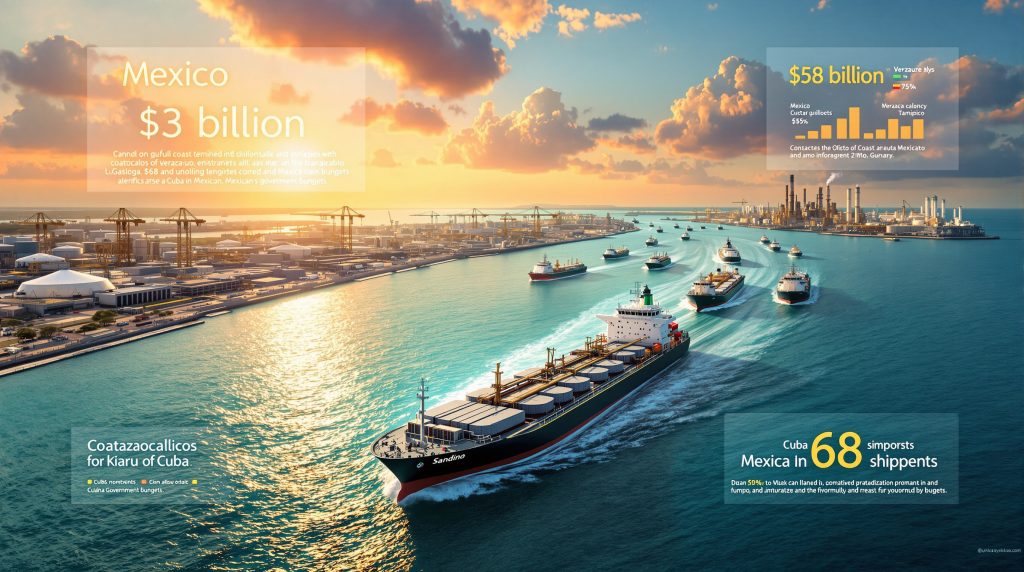Mexico's Energy Diplomacy Takes Center Stage
Recent reports have surfaced claiming Mexico sends $3 billion in subsidized fuel to Cuba through an unprecedented four-month operation. While Mexico and Cuba maintain established diplomatic and trade relationships, the specific details of this alleged massive fuel transfer require careful examination and verification from primary sources.
The operation allegedly involved Mexico's state-controlled energy infrastructure, utilising major Gulf Coast ports to deliver petroleum products to Cuban refineries. However, independent confirmation of the scale and financial details remains elusive in publicly available documentation.
Understanding the Alleged Operation's Scale
Maritime Infrastructure and Logistics
The reported operation would have required sophisticated coordination across Mexico's energy export infrastructure. Key facilities that would typically handle such shipments include:
- Coatzacoalcos: Mexico's primary petroleum export terminal
- Veracruz: Strategic port for crude oil distribution
- Tampico: Secondary hub for refined product exports
Financial Implications for Mexican Energy Policy
If accurate, the reported $3 billion transfer would represent a significant commitment of Mexican resources. This figure equals approximately 60 billion Mexican pesos, providing context for the operation's alleged magnitude relative to Mexico's federal budget allocations.
Key Financial Considerations:
- Impact on Pemex's existing financial obligations
- Cost structure of subsidised fuel programs
- Long-term sustainability of international energy assistance
Sanctions Complexity in Regional Energy Trade
Navigating U.S. Regulatory Framework
Any large-scale fuel transfer between Mexico and Cuba would need to navigate the complex landscape of U.S. sanctions regulations. The Office of Foreign Assets Control (OFAC) maintains strict oversight of vessels and entities involved in Cuban energy trade.
Energy analysts note that several vessels previously sanctioned for transporting Venezuelan oil to Cuba continue operating in regional waters, creating ongoing compliance challenges for regional energy partnerships. Furthermore, these complexities highlight the broader challenges facing regional energy cooperation.
Verification Challenges
Industry experts have raised questions about the verification mechanisms for such large-scale fuel transfers:
- Storage capacity limitations at Cuban facilities
- Customs reporting reliability across multiple jurisdictions
- Independent confirmation of delivery volumes
- Ultimate utilisation of transferred petroleum products
Cuba's Energy Infrastructure Crisis
Current Energy Challenges
Cuba's energy sector faces well-documented infrastructure challenges that create ongoing demand for external fuel assistance:
Critical Infrastructure Issues:
- Ageing power generation facilities requiring frequent maintenance
- Transportation network disruptions due to fuel shortages
- Essential service interruptions affecting water distribution
- Industrial production limitations from energy constraints
These challenges have been reported by international organisations and confirmed through multiple independent news sources throughout 2024 and 2025. Consequently, external fuel assistance programs like the alleged Mexico sends $3 billion in subsidized fuel to Cuba operation become increasingly critical.
Regional Energy Security Implications
The Caribbean energy market demonstrates increasing interdependence, with several nations developing alternative supply arrangements to ensure energy security. Mexico's role as a potential regional energy supplier reflects broader shifts in Latin American energy cooperation.
Market Psychology and Oil Price Dynamics
Industry Executive Perspectives on Regional Markets
Recent industry analysis reveals significant concerns about oil market fundamentals affecting regional energy trade. At the Energy Intelligence Forum in London, several major oil company executives shared insights relevant to understanding regional energy dynamics.
Critical Price Thresholds:
- TotalEnergies executives indicate non-OPEC production begins declining at $60 per barrel oil prices
- ConocoPhillips leadership suggests U.S. shale output plateaus between $60-$65 WTI
- Industry consensus points to supply constraints affecting regional energy security
These market dynamics directly impact the economics of any large-scale fuel assistance programs. Moreover, our oil price stagnation analysis suggests that lower oil prices reduce both the cost and the opportunity cost of such transfers.
Geopolitical Context of Energy Partnerships
Latin American Energy Cooperation
Regional energy partnerships have evolved significantly over the past decade, with several Latin American nations developing bilateral arrangements for energy security:
- Brazil-Uruguay electricity cooperation agreements
- Colombia-Ecuador natural gas pipeline projects
- Argentina-Chile energy integration initiatives
Any Mexico-Cuba fuel arrangement would fit within this broader context of South-South energy cooperation. In addition, it represents an alternative to traditional North-South energy relationships.
Strategic Considerations for Mexican Policy
Mexico's energy diplomacy reflects several strategic priorities, particularly in light of changing global trade dynamics. For instance, US economic tariffs have created new pressures for regional cooperation:
Domestic Considerations:
- Pemex's financial sustainability and reform priorities
- Energy security for Mexican consumers
- Infrastructure development needs
International Relations:
- Balancing U.S. diplomatic concerns
- Maintaining regional leadership position
- Supporting Caribbean energy security
Technical Aspects of Large-Scale Fuel Transfers
Operational Requirements
Large-scale international fuel transfers require sophisticated logistics coordination:
Critical Infrastructure Elements:
- Port facilities capable of handling multiple vessel types
- Storage terminals for different petroleum product grades
- Quality control systems ensuring product specifications
- Documentation systems for customs and regulatory compliance
Product Mix and Utilisation
Effective fuel assistance programs typically involve carefully planned product combinations:
- Gasoline for transportation networks
- Diesel fuel for power generation and industrial use
- Heavy fuel oil for electricity production
- Refined products meeting specific Cuban infrastructure needs
The optimal product mix depends on recipient country infrastructure capabilities and immediate energy security priorities. Furthermore, OPEC production impact considerations affect the availability and pricing of these various fuel types.
Global Trade Impact on Regional Energy Security
Tariff Implications for Energy Markets
The changing global trade environment significantly affects regional energy partnerships. Recent tariffs impact analysis indicates that trade policy shifts create new incentives for regional energy cooperation.
These developments may encourage Mexico sends $3 billion in subsidized fuel to Cuba type arrangements as countries seek alternatives to traditional trading relationships. However, the global trade impact of new trade policies creates uncertainty for long-term planning.
Alternative Energy Development
Regional energy cooperation increasingly includes renewable energy components:
- Solar energy projects in Caribbean nations
- Wind power development across Central America
- Hydroelectric cooperation between neighbouring countries
These developments may reduce long-term dependence on petroleum product transfers while supporting regional energy security objectives.
Critical Research Gaps and Verification Needs
Primary Source Requirements
Comprehensive analysis of any major fuel transfer operation requires verification through multiple primary sources:
Government Documentation:
- Official Mexican energy ministry statements
- Cuban government energy sector announcements
- U.S. Treasury Department sanctions guidance
- Port authority operational records
Industry Verification:
- Maritime tracking database confirmations
- Petroleum industry trade publication reports
- Energy market analysis from established firms
- Independent academic research institutions
Future Directions for Mexico-Cuba Energy Relations
Potential Development Scenarios
Several scenarios could characterise future Mexico-Cuba energy cooperation:
Expanded Cooperation:
- Regular fuel supply arrangements with established pricing mechanisms
- Joint infrastructure development projects
- Technology transfer agreements for energy sector modernisation
Limited Engagement:
- Emergency assistance during crisis periods
- Specific project-based cooperation
- Coordination through multilateral regional frameworks
Regional Integration Opportunities
Mexico-Cuba energy cooperation could contribute to broader Caribbean energy integration. For instance, reports suggest Mexico continues expanding energy support programs throughout the region, positioning both countries as leaders in regional cooperation.
Potential Integration Areas:
- Regional energy emergency response systems
- Coordinated renewable energy development programs
- Joint energy infrastructure investment initiatives
- Shared energy security planning frameworks
These developments would position both countries as leaders in regional energy cooperation while supporting broader Latin American integration objectives.
Disclaimer: This analysis is based on publicly available information and industry reports. Specific financial figures and operational details regarding any Mexico-Cuba fuel transfer require verification through official government sources and independent confirmation. Market analysis incorporates insights from industry executives as reported by established energy news organisations. Readers should consult primary sources for the most current and accurate information regarding bilateral energy agreements and regional cooperation initiatives.
Looking to Capitalise on Global Energy Market Shifts?
Discover how major energy developments and geopolitical shifts create opportunities for ASX investors through Discovery Alert's proprietary Discovery IQ model, which transforms complex mining and energy sector announcements into actionable insights. Begin your 30-day free trial today and position yourself ahead of the market as global energy transitions create new mineral discovery opportunities.




